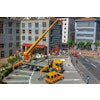By Dustin Walsh, Crain's Detroit Business
Following the harshest winter on record and concerns over funding, the Michigan Department of Transportation doubled down on technology for its largest project in a decade, the reconstruction of I-96.
The success of the project, which wrapped up last month, led MDOT to institute its e-construction program across all of its projects for fiscal year 2015 — a move that's expected to eliminate 7.4 million sheets of paper with a cost savings of up to $4 million.
On I-96, MDOT managed 65 staffers, 55 contractor and subcontractor firms and nearly 500 construction workers without issuing a single piece of paper. The $150 million project rebuilt the freeway between I-275 and Telegraph Road over seven months.
The department estimates the I-96 e-construction productivity gains saved the state more than $1 million.
"These are things we've been doing, but not rolled together," said MDOT Director Kirk Steudle.
"This is our opportunity to have really large savings."
Statewide, MDOT is expected to manage as many as 400 road construction projects on a $690 million road and bridge repair budget — part of its total $1.19 billion highway program — in the 2015 fiscal year that began Oct. 1.
Documents in the fast lane
The I-96 project, and e-construction in general, is beyond simply eliminating paper but is focused on technology implementation, including the use of iPads and iPhones in the field, mobile design and construction surveying software, electronic document submittals, automated document workflows, and other upgrades.
"Implementing a change (in design or process) could take as long as 120 days for approvals," said Steudle. "We can now reduce that to three or four days, seeing unparalleled gains in productivity."
MDOT completed three small-scale pilot projects using e-construction in 2013, including an I-96 interchange in Howell, and realized instant savings, said Tony Kratofil, metro region engineer for MDOT in charge of the project.
One pilot project, in particular, saved 170,000 pieces of paper and $300,000 in printing, mailing and time spent dealing with paperwork, according to an MDOT presentation on e-construction. The cost savings were estimated at $180,000 to MDOT and $120,000 for the contractors on the project.
Besides paper reduction, cost savings for MDOT come in the form of efficiencies that reduce overtime, Kratofil said.
For example, MDOT is required to monitor the payroll of contractors during a project, which during the I-96 work involved 773 invoices. This typically takes mul-tiple staffers. Using electronic filing and signatures, MDOT saved "thousands of hours" by reducing the role to only a part-time duty, Kratofil said.
"Those inspectors can now be on the job site and be more effective," Kratofil said.
Steudle said the I-96 reconstruction was projected to cost $175 million, but with the implementation of e-construction, Shelby Township-based firm Dan's Excavators Inc. was able to bid the project at $150 million.
"We were able to reinvest that extra $25 million in other projects; and I believe (e-construction) lowered the bids and the number of days to complete," Steudle said. "Moving forward, time is money, and the ability to turn documents quicker will reduce our costs."
Joe Goodall, project manager of the I-96 reconstruction for Dan's Excavating, said the e-construction initiative expedited communication between contractors and MDOT, resulting in a more fluid construction process.
"It sped up the submittal and review process; shop drawing (design) review was seen ... as soon as it was uploaded," Goodall said in an email to Crain's. "We would get contract modifications approved much quicker."
Dan's Excavating employees were trained on the system by MDOT ahead of the project — which was the first time the construction firm had used a fully-paperless system, Goodall said.
The freeway reopened Sept. 21, and MDOT's success with e-construction has drawn national interest.
MDOT is working with the U.S. Department of Transportation's Federal Highway Administration, along with the Texas Department of Transportation, to accelerate e-construction deployment nationwide, said Bryan Cawley, project manager for FHA's Office of Infrastructure.
The FHA, with assistance from MDOT, is hosting a series of webinars on e-construction with other state DOTs and will hold seven regional seminars ahead of a national deployment in 2015 and 2016, Cawley said.
"We're trying to expedite our process and minimize our overhead costs; more technology is one means of doing that," Cawley said.













![Fcp Racatac Chair 10893876[1]](https://img.forconstructionpros.com/mindful/acbm/workspaces/default/uploads/2025/10/fcp-racatac-chair-108938761.10l0At5WXv.png?ar=16%3A9&auto=format%2Ccompress&bg=fff&fill-color=fff&fit=fill&h=135&q=70&w=240)
